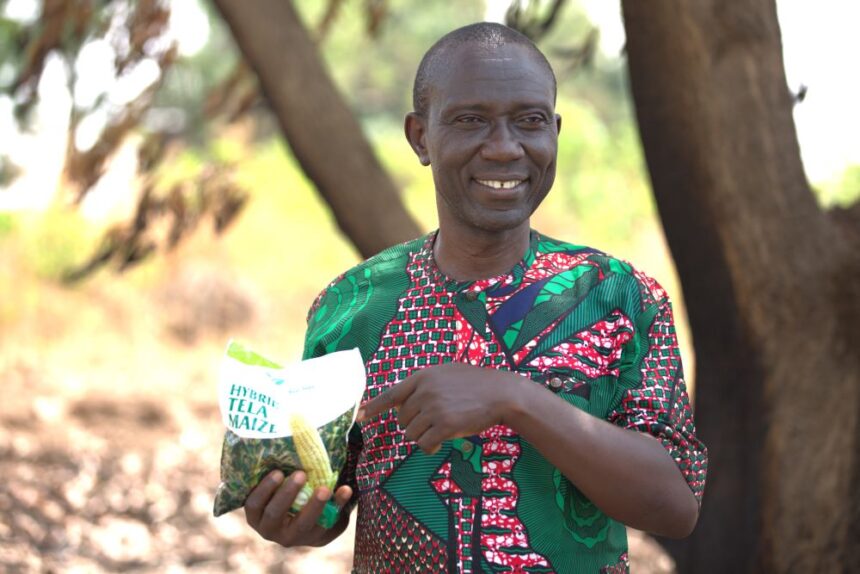Nigerian businessman narrates how investing in TELA Maize farming has helped him recover his finances and personal confidence after the grave losses he suffered while treating a life-threatening ailment
By Onche Odeh
Cyprian Edeh, a 51-year-old resident of Karu, a suburban settlement that borders the southern fringes of Nigeria’s Federal Capital Territory (FCT) once had a thriving business that made him an envy of all.
Edeh who hails from Nkanu East, Enugu State in the Southeastern part of Nigeria known for their astuteness in businesses, lived up to every expectation that was demanded of him at the time, until trouble struck.
In 2017, his business ran into murky waters after he was diagnosed of a life-threatening ailment.
While narrating his ordeal at the time in an interview with AfricaSTI, Edeh said, “I was diagnosed of a life-threatening ailment that took almost everything that I ever made from the string of businesses I was running at a time and was faced with the worst odds that life could bring. The financial burden was crushing, and my health was deteriorating.”
Luckily, Edeh was able to pull through, as he became well again. But he was faced with the audious task of restarting his life, as he had his family and other personal needs to tend.
Desperate for a solution, Edeh decided to take a chance in farming, a decision that was seen as awkward by many who knew how well his business thrived but never were aware of the health challenge he faced.
For Edeh, it was a breath of fresh air, as he found solace in maize farming. His farm, located in Laminga, an agrarian community in Nasarawa Eggon, in Nigeria’s North-central state of Nasarawa was just what he needed to bounce back to life after losing almost all that he had.
The start was promising as he made some good harvest during the first year. But subsequently, the promises started crumbling as the harvest from the farm that he had invested all the resources he was able gather plummeted in the following year. The once blooming maize farm became a target of pests amid the unstable weather outcomes that saw farmers like Edeh suffer losses.
“It was not an easy start with the maize farming. I suffered grave losses because of inexperience. I didn’t know the right seed to plant and had faint knowledge of the difference between soils to plant on. I didn’t even know that there are pests that can hurt maize. These, added to the fake farming inputs caused me to lose so much money at the onset.”
Edeh said he lost up to 3 million naira in the particular year to the farming of conventional maize variety and other crops by the side.
But he found succour once again after taking time to search for solutions.
“After the bad experience with the harvest, I started making researches and relating with some friends at the Institute for Agricultural Research (IAR) in Zaria, as well as other relevant research institutes such as the International Institute for Agricultural Research (IITA). It was in the course of this search that I was told about TELA Maize. I was particularly moved by the story of how the drought-tolerant maize helped farmers in other African countries regained their livelihood. I was moved by a particular story of how farming this variety of the crop was able to give a very poor family a life to behold, including owning their own homes.”
Moved by these stories, Edeh said he did not have to think twice before taking advantage of TELA Maize, a decision he said has led him to glutting in bountiful maize harvest.
“The maize is very compact and the cobs are very heavy, such that my workers would take it and exclaim at the fullness. They were so excited to see the size and the weight of the maize, despite looking like the regular variety,” Edeh said in the interview with AfricaSTI.
He said the difference between TELA Maize and the conventional maize variety is clear.
“With other varieties of maize that I have been planting, I usually would get 28 bags per hecatre. But with the teller maize, I now have 42 bags for the same size of land. Previously, I would have spent up to 300,000 Naira or more spraying chemicals against pests and application of fertilizer with other varieties. But with TELA Maize, I did not spend a dime,” Edeh disclosed.
With the support of extension workers under the stewardship programme of the African Agriculture Technology Foundation (AATF), Edeh said he learned new farming techniques that made it easy for him to adopt the resilient maize varieties, and implemented sustainable agricultural practices. As he worked tirelessly on his farm, he began to see the fruits of his labor.
The results have been astonishing, as Edeh now runs a flourishing maize farm that is providing him with a steady income, food and a sense of purpose. The financial stability he gained has also allowed him to focus on his health, as he slowly has been able to rebuild his life.
Today, Edeh’s farm is thriving, and he’s proud to be contributing to his community’s food security. He currently maintains a food storage stocked with bags of maize, part of the harvest from his TELA Maize farm in Laminga.
His story is a testament to the power of innovation and resilience. TELA Maize farming didn’t just save Edeh’s farm. It saved his life.
Edeh’s journey back to living a fruitful life serves as a beacon of hope for others facing similar challenges in Nigeria and Africa. His determination and the support of TELA Maize have given him a second chance at life, and he’s grateful for the opportunity to share his story.
Since its launch in June, 2024, growing large number of smallholder farmers across Nigeria have been benefiting from the farming of TELA Maize, a set of improved varieties of Maize that have been engineered by scientists at the Institute for Agricultural Research (IAR) at Ahmadu Bello University, Zaria, Kaduna, Nigeria to tolerate drought, exhibit protection against stem borers, and significant resistance to the fall armyworm.
Like Edeh, these smallholder farmers have been speaking of how the variety has reduced their expenditures on insecticides, minimized exposure to harmful chemicals, and improved yields with superior grain quality.





